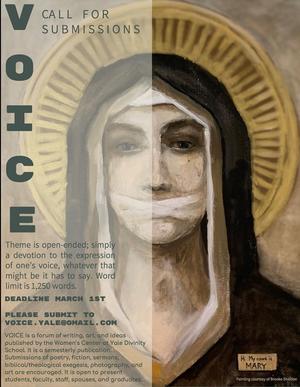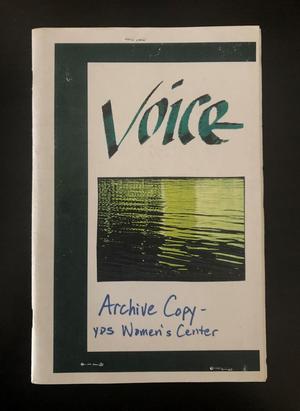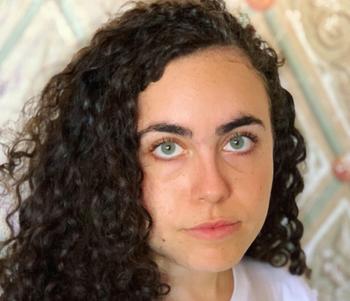In only her first few weeks at Yale Divinity School, Sarah Ambrose ’22 M.Div. made a daring personal commitment to reestablish the institution’s long-lost feminist publication, VOICE, a journal of literary and theological ideas, in a dedicated effort to lift up the expression of women and non-binary students within the Yale community.
Now in her second semester at YDS, she is seeing her work pay off. Ambrose has established an editorial team, negotiated funding, and lined up a printer. Coinciding with the current 50/150 anniversary celebrating women’s acceptance into Yale College and Yale University, the revitalization of VOICE could not have come at a more opportune time.
Moriah Lee ’20 M.A.R. conducted the following Q&A with Ambrose to learn more about the revived journal and its history and significance.
______________________________________________________________________________
 Tell us a bit about the history of VOICE and the journal’s current purpose.
Tell us a bit about the history of VOICE and the journal’s current purpose.
VOICE is a biannual journal of literature, art, and theological ideas that honors the dangerous memory of women and non-binary communities through creative expression.
I’ve come across some archives that outline how the journal became established, and these documents speak about a class taught by former YDS professor Serene Jones ’85 M.Div., now the President of Union Theological Seminary. Apparently there was a young woman in the class who, when she got up to deliver a presentation, inexplicably lost her voice halfway through. She simply could no longer speak. The students knew there could be a biological explanation for this phenomenon—for example, nervous system overload—but they effectively realized that women frequently experience a loss of connection to their voice. From that incident VOICE was born in 1996.
The journal in the past was concerned with creating a forum for women’s voices, a safe space where their work could be featured and elevated. This idea of disconnection from one’s voice is something the journal is still concerned with today. We want to honor the legacy of silenced women of the past, while also enabling the voices of women and non-binary persons in the present moment.
 How did you become acquainted with VOICE?
How did you become acquainted with VOICE?
It was all very happenstance. During BTFO (“Before the Fall” Orientation) I made a trip over to the Women’s Center to look through some old archives and happened across boxes and boxes of VOICE’s last 2002 issue. After thumbing through the papers and asking the administration about the journal (which no one had heard of at the time), I immediately went to the director of the Women’s Center, Pricila Chavez Lara (’20 M.A.R.), to see if VOICE was something I could resurrect—I have a literary background and am interested in feminist theology, so it basically encompassed all my interests. A few days later we ended up meeting with administration and had the approval to reestablish the journal. The administration was very excited about the project.
What have been a few of the logistical challenges behind reestablishing this journal?
We are essentially a start-up working on a tight deadline with a tight budget, so readying the journal for publication has been difficult, if not turbulent. One of the greatest struggles has been the lack of an academic mentor, like a professor or administrator, to take the journal under their wing. In the past, the famed feminist theology professor Letty Russell supervised the journal. Moving forward, academic supervision will really be key to the journal’s success.
Tell us a bit about you. What inspired you to carry on the journal’s legacy?
I went to Barnard College in New York and studied literature there. In my junior year I became fascinated by the matriarchs of Christianity, specifically Mary Magdalene and the Virgin Mary. I think that is one of the main reasons I am interested in the female voice.
Coming from Barnard College (an all-women’s institution), I was used to seeing feminist projects and had curated a few of my own, but coming here I’ve found a lack of feminist projects dedicated to the students specifically. One reason I was so keen to take on the project is that this journal is absolutely an opportunity for the students, and it’s an opportunity that has not existed since 2002. I am truly excited to see what kinds of submissions we receive to take stock of the thoughts and topics occupying the minds of YDS students today.
 I am currently an M.A.R. student in Women’s, Gender, and Sexuality studies, but am transferring to the M.Div. program. I know for certain now that I would pursue ordination in my tradition, the Catholic tradition, if I could. My transfer to the M.Div. is a political stance in that I will gain as much knowledge as I can about the ordination process, and then use that information to advocate for women’s ordination, especially the female diaconate. I suppose I am used to coming from a tradition in which I don’t have full opportunity, and my response has always been to try and create opportunities within the system.
I am currently an M.A.R. student in Women’s, Gender, and Sexuality studies, but am transferring to the M.Div. program. I know for certain now that I would pursue ordination in my tradition, the Catholic tradition, if I could. My transfer to the M.Div. is a political stance in that I will gain as much knowledge as I can about the ordination process, and then use that information to advocate for women’s ordination, especially the female diaconate. I suppose I am used to coming from a tradition in which I don’t have full opportunity, and my response has always been to try and create opportunities within the system.
Who can submit to the journal? How can students submit?
Yale Divinity women and non-binary students, alumni, and spouses of current students are invited to submit academic papers, artwork, photography, poetry—anything encompassing creative expression, really—to the VOICE email at voice.yale@gmail.com. Submissions are also open to graduate students of the Yale Department of Religious Studies. Please limit submissions to 1,250 words.
Our priority deadline is March 1st, but we will be accepting late submissions until March 8th. We also have a Facebook page that offers more detail about VOICE and features our upcoming events. Anyone who wants to support this project and get involved is welcome. Please send us an email and you’ll hear back from us quickly.
Students interested in looking at past VOICE publications can find the archives at the Yale Divinity Women’s Center.